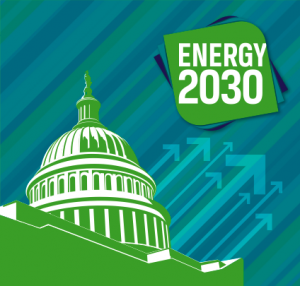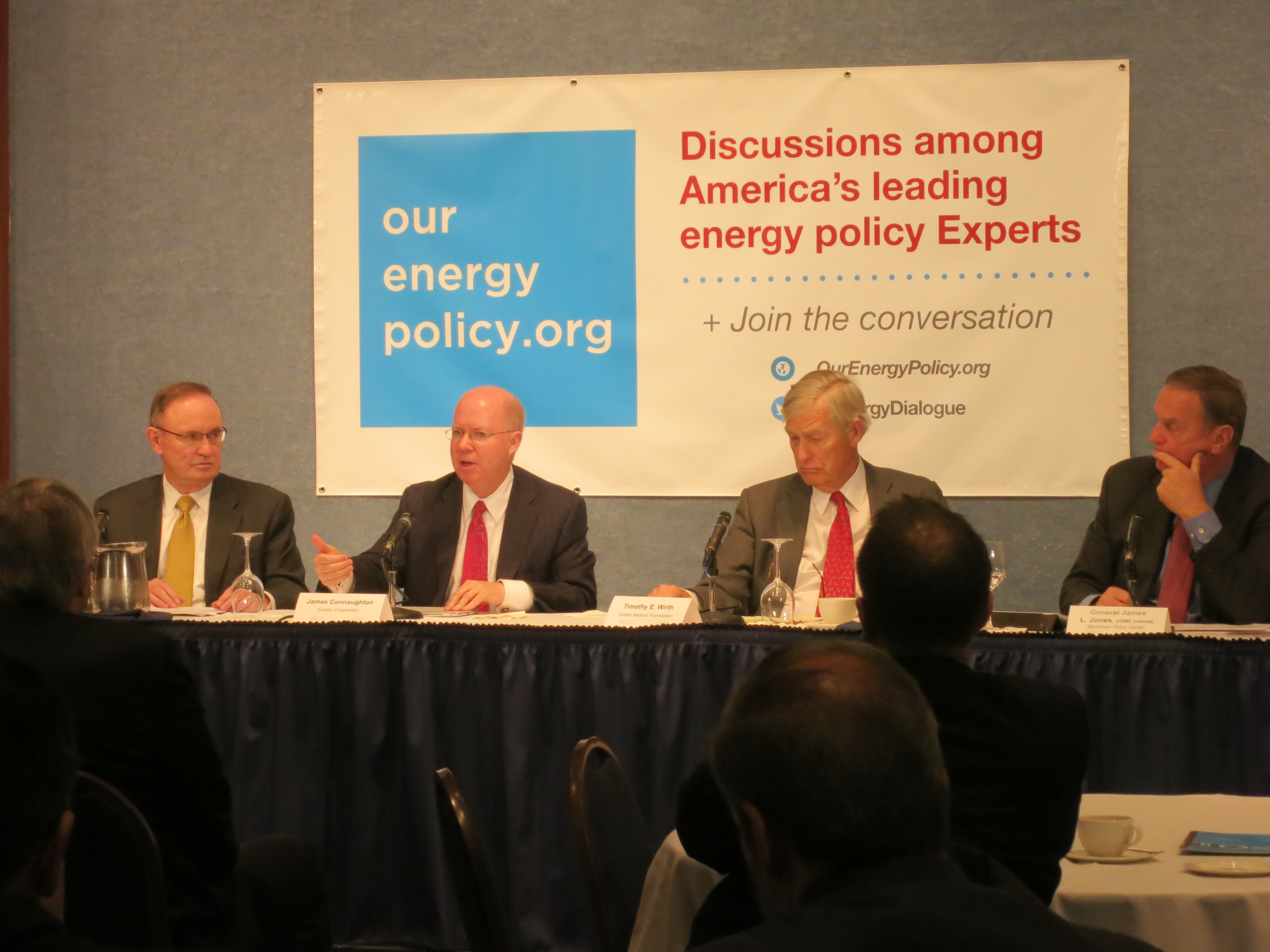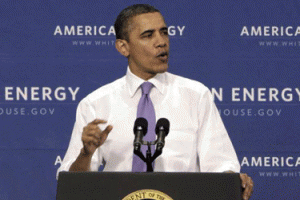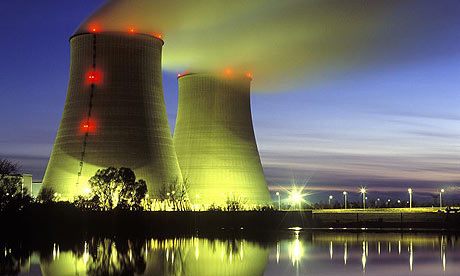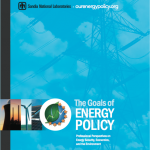30 item(s) were returned.
A diverse coalition of energy leaders put together by the Alliance to Save Energy (ASE) recently unveiled a set of recommendations for “Doubling US Energy Productivity by 2030.” Chaired by Senator Mark Warner (D-Va.) and National Grid U.S. President Tom King, the Alliance Commission on National Energy Efficiency Policy calls for growing the U.S. economy through investments, modernization and education. The Commission’s goal of doubling U.S. energy productivity (GDP/Btu) by 2030 was alluded to by President Obama in the State of the Union as was one of the Commission’s recommendations, an energy productivity “race to the top” type program. ASE… [more]
View InsightLast week Senator Lisa Murkowski (R-AK), the senior Republican on the Senate Energy and Natural Resources Committee, published a blueprint for energy policy, titled “Energy 20/20: A Vision for America’s Energy Future.” The blueprint offers ideas to “align federal policy with… our national interest to make energy abundant, affordable, clean, diverse, and secure.” Among the main ideas in Sen. Murkowski’s blueprint are: Establishing a national goal to become independent of OPEC imports by 2020 by increasing domestic oil, biofuel and synthetic fuel production. Approving the Keystone XL pipeline. Opening the Arctic National Wildlife Refuge to oil and gas drilling and… [more]
View InsightUpdate: See a video recording of the event here OurEneryPolicy.org’s high-level panel discussion, moderated by Chief National Correspondent for the Fox News Channel Jim Angle, and featuring James Connaughton, General James L. Jones, and Timothy Wirth, had an overall tone of optimism for energy policy for next four years and beyond. Here are some event highlights: The panelists saw hydraulic fracturing as presenting an economic, energy security, and emissions reduction opportunity, but agreed that smaller “mom and pop” operations engaging in substandard industry practices could turn public opinion against fracking. However, there is an opportunity for industry leaders, such as… [more]
View InsightA new report from the Bipartisan Policy Center calls for a “National Energy Strategy Council” that would coordinate and oversee the efforts of the multiple federal agencies, such as Energy, Commerce, Defense, and Interior, that generate our national energy policy. Chaired by the Secretary of Energy, the council would be “responsible for leading cross-agency coordination for all major energy-related decisions… and for resolving interagency disputes.” The “energy renaissance” taking place has made such a council all the more important, as opportunities for the economy and national security will be wasted by the current fragmented policy making apparatus, according to the report. The report also calls for… [more]
View InsightThe election is over. What comes next for energy policy? Some environmentalists have already answered that question by planning a demonstration outside the White House to press President Obama to prevent the approval of the Keystone XL pipeline. They’re also likely to push the President on continuing support for renewables and taking concrete action on climate policy. Meanwhile, Jack Gerard, President and CEO of API, offered this take : “Right off the bat, the president can approve the Keystone Pipeline and put thousands of Americans to work immediately. He can acknowledge the effective role states are already playing in regulating… [more]
View InsightThe Japanese government, which had announced a gradual phase-out of nuclear power by 2040, reversed that position and will instead develop an energy policy “with flexibility, based on tireless verification and re-examination.” The country was faced with the difficulty of replacing the 30% of electricity it gets from nuclear energy, and altering an existing strategy that would have seen that number rise to 50%. The reduction in nuclear energy usage would have come through greater reliance on renewable energy, conservation, and the use of fossil fuels, according to the original plan. Although nuclear will remain in the mix, no new… [more]
View InsightAccording to a national survey of energy professionals jointly prepared by Sandia National Laboratories and OurEnergyPolicy.org, U.S. energy policy should simultaneously pursue energy supply security, economic outcomes, and minimized environmental impacts. Contemporary political discourse often poses energy policymaking as a binary decision—the economy versus the environment, for example. Public opinion polls frequently support this conception, posing energy policymaking options as a zero-sum game between two opposed goals. However, does this tension in the discourse accurately reflect how policy is made? Do energy professionals — people working on energy issues daily — view U.S. energy policy in this way? How might professional insights… [more]
View InsightSenate Republicans recently unveiled the “Domestic Energy and Jobs Act,” an energy bill intended “To approve the Keystone XL Pipeline, to provide for the development of a plan to increase oil and gas exploration, development, and production under oil and gas leases of Federal land, and for other purposes.” Sen. John Hoeven (R-ND), who drafted the bill, has said that Romney would offer similar legislation if elected. Provisions of the bill would: Suspend U.S. EPA rules on refineries, pending a gas prices study Impose a minimum threshold on the amount of oil and gas leasing each year Reverse a Bureau… [more]
View InsightActivists and policy stakeholders often put forward a single policy action that, they argue, would have broad and beneficial cascading effects, essentially acting as a fix-all for America’s energy troubles. Examples of these include unfettered domestic oil and gas development (“drill, baby, drill”), a price on carbon, a flex-fuel mandate, a clean energy standard, etc. Last week, we asked what a comprehensive national energy policy might look like. Absent a comprehensive national energy policy, what single policy action, if enacted and implemented, would have the biggest impact on America’s energy landscape? What single policy action would improve America’s energy landscape most? What… [more]
View InsightIn an opinion piece in the New York Times, writer David Ropeik argues that the nature of how humans perceive risk has led to some impractical, and potentially counterproductive, energy and environmental policies. According to research cited by Ropeik, the following factors make people more likely to perceive higher levels of risk: “Human-made risks upset us more than risks which are natural; Risks imposed on us are scarier than those we take by choice; Risks grow scarier the greater the pain and suffering they cause.” These perception factors percolate into our energy and environmental policy, Ropeik argues, sometimes leading to… [more]
View Insight